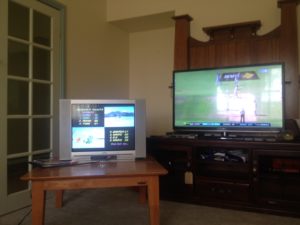January 30th, 2019
I’m Sad That Interns Don’t Want to Do a Palliative Care Rotation
Justin Davis, MBBS
It’s an exciting time for final-year medical students in Australia. Exams are over. They’re in their last-ever clinical rotations, and they’ve finally found out in which hospital they’ll be starting their careers. Most are happy. Perhaps some aren’t, I dunno. But most are simply excited to finally start their intern year as doctors, having spent 8 or more years in college and medical school. Finally getting to practice medicine. I suspect the fact they’ll be getting a regular wage is also something they’re looking forward to. I was surprised when, all of a sudden, I could afford a bigger tv after a few weeks of work as an intern.

The final day of my own medical school time. Cricket on the right, Mario Kart on the left. And beer, of course.
Of course, finding out which hospital you’ll be working at also comes with finding out about rotations. These are definitely more varied than hospital choices — your new hospital will often offer a gajillion different rotations. (I wonder how many zeros a gajillion is? *looks it up* — Oh, it’s an unspecified large number. OK, so a gajillion is correct.) Here in the Land Down Under, our interns are required to have an emergency medicine rotation, a surgery rotation, and a general medical rotation in order to satisfy their intern training requirements, so those are not optional. The others could be anything. Perhaps even rotations you wouldn’t necessarily choose.
So, I was chatting with intern friends about their rotations. Overall they were pretty happy with their particular list of rotations for next year, but several people noted that their colleagues who were assigned palliative care rotations were trying to swap them out. And they wondered why anyone would agree to swap anything for a palliative care rotation.
This really saddened me. It made me muse and reflect on my own experiences as a palliative care intern and how good that rotation had been for my medical learning and growth. Why wouldn’t our newly minted doctors want to experience the personal improvement that working in palliative care could provide?
Of course, there is a story behind all of this (like most of the blog posts I write, I’ve come to realize). I was quite happy with my own intern rotations: with the aforementioned emergency, surgery, and general medicine already allocated, I was given palliative care and orthopaedic rehabilitation as my optional ones. My own intern year started in emergency medicine.
The next paragraph is tricky. Emergency medicine was a… difficult rotation. Outside of intensive care, which I would experience later as a registrar (have you ever felt the dread of standing alone at 2am staring at an ECMO machine while your patient has just crashed, having never seen an ECMO before or had anything to do with one and wondering what the next steps are? I have.), emergency medicine was, by far, the most challenging experience I have had as a doctor. I think everyone, when they start out, has an existential crisis when they realize they have the responsibility of, you know, caring for sick patients. But, if you start in general medicine, you have ward-based registrars to run decisions through, which lessens the brunt of that responsibility.

Palliative care is about endings, but endings can be beautiful. I love sunsets, so putting nice ones into this blog goes with the spirit of palliative care.
There is a different culture to emergency medicine. Cold neon lights illuminate that place, no matter what the time or weather is outside. Like all of medicine, it’s a grinding wheel that never stops, but the relentless pressure there is something else. I remember walking down the corridor one day, with monitored cubicles to my right that continually beep and alarm like every patient is going into VT (they aren’t) and my second-favourite staff base to my left (you can have favourite staff bases. Don’t look at me like that), and thinking I had just wasted the last 8 years of my life. I should have stayed working at Dan Murphy’s (Uncky Dans is a liquor store chain in Australia, and I have to admit, if you’re going to have a part-time job to support yourself through university, you couldn’t ask for a better one). And all that excitement about working? Starting out? Finally being a doctor? Gone. Extinguished under the cold neon lights, while another category 2 comes into resus 3, and the monitored cubicles alarm for no good reason.
But, something happened that changed my perspective. That “something” was my palliative care rotation, my second rotation after the battering and brutal introduction that emergency medicine gave me. Instead of having to move patients to somewhere, anywhere, as long as it’s out of emergency, quick! Quick! And the relentless pressure … palliative care was a completely different experience. We had time for patients and their families. To sit down and talk with them about the issues they were having and what we could do to make their lives better. We didn’t need to investigate everything to make sure it wasn’t dangerously lethal, or to do things quick! Quick! Instead, the focus was on comfort, dignity, and making people’s lives better in what time they had left. Focusing on their needs and how we could best address them. Time. Empathy. Compassion.
It changed my outlook on wanting to work as a doctor and my enjoyment of the job. It was a liberating experience to be a part of a team of doctors and nurse practitioners (whom I cannot thank enough) who simply made people’s lives better without investigating, referring, testing, or moving patients. Just talking, focusing on essential medications that would take their symptoms away, and having the time to spend with patients and their families, listening to their concerns. You could tell it was a valuable experience for the people whom we consulted on, and it certainly was for me as well.

And another sunset, taken one night on the three and a half hour drive to my rural hospital placement.
The business that is specialist medicine has the potential to draw out the worst qualities of the medical grindstone. Sometimes, we simply have too much to do in one day. This is why I was saddened to learn that others wouldn’t want to experience a rotation like palliative care during their own intern years. Perhaps they won’t come to it from as low place as I did, but the experiences and the satisfaction of just making people feel better is something that new doctors shouldn’t miss out on. When I fnd myself having difficult discussions with patients and their families, I often reflect on the conversation skills that palliative care taught me. But mostly, it was nice to do so much for people by doing so little. A palliative care rotation is definitely worth swapping into.
“With time, every epilogue extends into a sequel.”




I will glad to being so kind of work right now. I look forward to so kind of part time job. Congrat to al the graduates.
Well said Justin!
Palliative Care is full of medical nuances you’re unlikely to experience anywhere else.
Thank you…
Thank you for speaking to the value of palliative care experience in broadening our skills in caring for all patients.